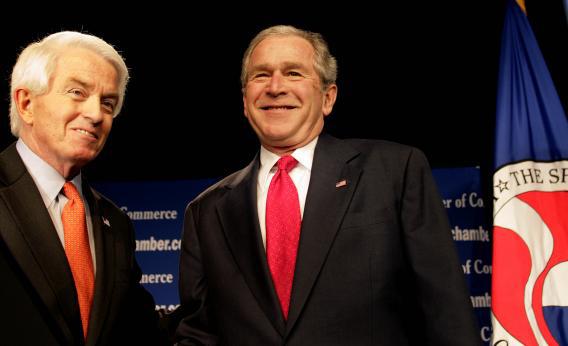Over the weekend Sabrina Siddiqui and Paul Blumenthal did a Huffington Post piece about how lawmakers backed financially by the U.S. Chamber of Commerce aren’t necessarily voting in favor of measures the chamber says it supports to do things like reform the immigration system or pay for America’s transportation infrastructure.* Similarly, Jill Lawrence has a piece in National Journal suggesting that some of the hot new tea-fueled insurgents may be a bit too nutty for the business lobby’s tastes.
Well, it’s a nice thought. But I think the evidence says otherwise. The chamber obviously isn’t thrilled with each and every thing that each and every Republican member of Congress has said or done, but the fact is that they are deeply in love with the Republican Party and desperately want to see it gain more political power in the United States. Greg Sargent reminds us that we’ve seen this before and “[a]fter business groups helped bankroll the Tea Party insurgency in the 2010 midterms, the Congressional GOP staged a debt ceiling crisis in 2011 that those same groups saw as reckless and dangerous.” So how mad was the chamber about that? So mad that they spent $24 million to try to help Republicans win Senate races. They were so fanatic about this that they even dumped money into an obviously doomed attempt to stop Angus King from winning a Senate race in Maine.
They looked at the behavior of congressional Republicans in 2011 and decided that they really loved Republicans and that Republicans holding power in congress was “what organizers call ‘the first insurance policy’ if Obama were to get reelected.” And now they’ve had even more time to observe congressional Republicans’ behavior, and they’ve decided that they still love Republicans. So far 100 percent of chamber spending on 2014 campaigns has gone to Republicans, including Republican leader Mitch McConnell.
Which, again, isn’t to deny that on an issue-by-issue basis the chamber sometimes disagrees with Republicans. But they don’t really seem to care about that very much. And it’s no surprise. If you look at their jobs and growth agenda, the No. 1 item is to cut taxes, the No. 2 item is to do less regulation of fossil-fuel pollution, and the No. 3 item is to gut Obamacare. Immigration isn’t even on the list. And I don’t think it’s particularly complicated to see why the chamber is so deeply invested in Republican Party electoral success. “Business” is a very multifaceted thing that doesn’t have a ton of obvious interests in common. But one thing that all successful businesses do have in common is that they are all managed by rich businessmen. And one thing that rich businessmen can easily agree on is the importance of reducing the tax burden on rich businessmen. And the overarching policy disagreement between the Democratic and Republican parties at the moment is that Democrats would make rich businessmen pay higher taxes, whereas Republicans want to cut their taxes. In an operational sense, this is the sticking point of all policy disagreements in Congress, and in an operational sense it’s the issue that the chamber cares about.
So while they may grumble that the bunch of tax-cutting fanatics they’ve put into office often insist on doing and saying crazy things, the chamber has no intention of doing anything other than continuing to try to put them in office.
Correction, Aug. 19, 2013: This post orginally misspelled Huffington Post reporter Sabrina Siddiqui’s last name.
